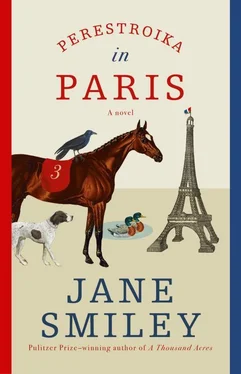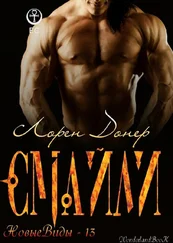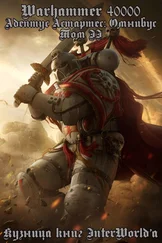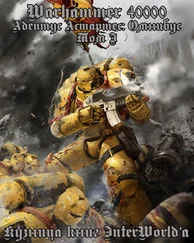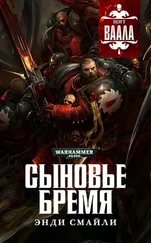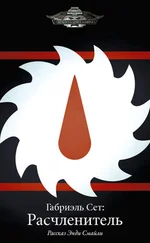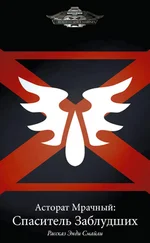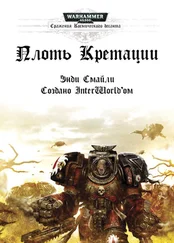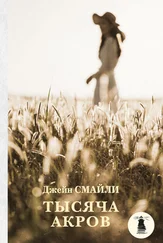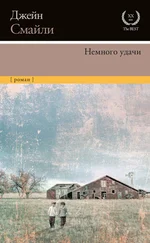IT WAS FRIDA who woke Étienne up, barking like mad in the courtyard. Paras lifted her head and said, “Why are you making that awful noise?”
Frida paused and said, “I don’t know,” and resumed barking.
Paras hoisted herself to her feet, walked over to Frida, and stood over her. She pinned her ears, narrowed her eyes, and switched her tail in a threatening manner, but it was evident that Frida didn’t know horse body language, because she just kept barking. At last, and with some misgivings, Paras bumped Frida with her knees and knocked her over. There was silence.
Paras said, “What is going on?”
“Everyone needs to know.”
“To know what?”
“I don’t know. Something. Something important. Whatever it is, it is making my skin tingle and my hair curl.”
“Your hair isn’t curling.”
“That’s what it feels like.” She rolled energetically in the grass, twisting her body this way and that; then she rolled onto her stomach and put her paws over her ears. At last, she said, “I felt this before, but I didn’t know what it was. Now maybe I do. It was when my human vanished.”
Paras looked up at the window. There was Étienne, staring at her. She said, “The boy is fine.”
Frida blew out a long breath.
Thanks to the barking, Étienne was wide awake, but a little disoriented. Why was he sleeping in the grand salon? What time was it? Where was his great-grandmama? What was for breakfast? He staggered a little as he went toward the cuisine, thinking that the answers might be there, and the staggering reminded him of his nighttime adventure, cantering around the Champ de Mars in a dream. This had the effect of making him feel more rather than less disoriented. It wasn’t until he had scarfed down a piece of bread, some cheese, and a large glass of water that he felt like himself. At that point, he yawned and cleaned up the cuisine as best he could—just the day before, his great-grandmama had run her hand along the top of the table and made a sad face. Not a scowl—she was not angry—but it was clear that, distracted as he was by the horse, he was doing a poor job of maintaining the house. Kurt could have told him that his own distraction had resulted in his complementary failure in waste management, but Étienne had never known how great a contribution to his efforts Kurt had made.
Only after wiping the table, rinsing the sink, sweeping the floor, and closing all of the drawers and cabinet doors did Étienne bring his attention fully to the old lady. He thought that she had to be somewhere—perhaps, given her energy when they went to the shops again just the day before, she had gotten dressed and left the house! And so he hurried out of the cuisine, through the grand salon, across the hallway. He knocked, even though she would not be able to hear him, and then put his hand on the door to her chamber, eased it open. The room was quiet. Like Conrad, he at first didn’t see her—she had gone out! But no—her hat with the feather was in its customary spot. Then he did see her. Her covers, including the great coverlet she’d been knitting, were drawn up over her chin, with her pillow hiding her forehead. He stared at her for a long time, and then he crept toward the bed. After a moment, he slipped his own hand under the covers and found hers. He squeezed it. It was small and cool and stiff. The day had come, Étienne thought, the day when he no longer knew what to do, down to the least little thing.
Jérôme, at the market, also felt uneasy for some reason. He found himself stepping out into the street without meaning to, looking left, looking right, making himself go back into the shop, only to step out into the street moments later.
Anaïs, in her apartment, was brewing herself a cup of tea. She poured the boiling water right onto her hand, cried out, put her hand under the cold tap, and started to weep. Anaïs hadn’t wept in years, she thought; as for burning herself, she did that all the time, but this time was different, somehow.
Pierre, who still had his earplugs in from his morning operating the leaf blower, stepped out of the equipment shed and saw dark clouds to the north—unexpected, because the forecast had been for days of sunshine. He went back into the shed, felt a chilling breeze, found a jacket. When he’d finished hanging up his tools and making the signs he had to redo every year to remind his crew where to put things, he went back outside. Brilliant sunshine. Unaccountable, really.
The gendarme made up his mind to consult his superior officer about that house. There was something funny about the place, and the gendarmerie needed to look into it. He knocked on the office door, then knocked again. Another officer went by, told him that the boss was in Nanterre for the afternoon. Whatever it was would have to wait until tomorrow, but tomorrow was his day off. Okay, he could wait two days.
Frida was not barking anymore. She was lying quietly in her dip, silent, not even mumbling, almost invisible under the vegetation.
Paras continued to sample the grass and weeds. She knew that Frida thought she was insensitive or indifferent. She wasn’t. She was preparing herself.
Raoul knew exactly what was going on. He stood on the sill of the old lady’s window, tapping. He could see that she had passed, and he knew that it was the animals who had to save the boy.
Delphine felt nothing special, apart from the anxiety she always experienced before a big race. Since she trained horses for both jump races and flat races, her worries were different for each. When she put a horse in a race over the hurdles or the jumps, she imagined the horse falling more than anything else. Now she stood, leaning on Whiskey Shot’s stall door, watching him gobble down his hay. He was a flat racer, less likely to fall, especially since the ground was dry and firm. But was he too fat? Was he too tall for his age? Would the jockey be able to control him? He liked to come from behind, always a hazardous strategy. If they bunched in front of him, would he try to barrel through the pack, putting himself and everyone else at risk? Delphine wiped the sweat off her forehead with the sleeve of her shirt.

BECAUSE ÉTIENNE DIDN’T KNOW what to do, he did what he knew he should have done before this, which was to clean, clean, clean, first the cuisine, then the grand salon, then the library. He put away, he threw away, he wiped down, he swept, he straightened. In his great-grandmama’s chamber, it soothed him to walk around her, picking up this and that, placing her cherished possessions exactly as she would wish them to be if she were, indeed, a ghost (she had never said anything about ghosts, but there were ghosts in books, just as there were horses in books—a horse had shown up, so perhaps a ghost would also show up). Several times, he went to her and kissed her on the forehead. He made very little noise, because he did not have a vacuum cleaner, and so the gendarme, who altered his route in order to peek through the fence with all of its vegetation and to listen for telltale noises, could make out nothing. Yes, a raven was tapping on a windowpane, up on the first floor—that was unusual, but it was not against the law, or even a matter for Animal Control. He had other things to do until his shift ended, but he thought he might come back, even though tomorrow was his day off. He could explore a little more aggressively—not in his uniform, but as an interested private citizen.
As Étienne made order in his great-grandmama’s chamber, he got more comfortable with what most books would have called the cadavre or the restes humains. He did not know what he should call it, but both of these terms seemed too final. He glanced out the window. Paras, Frida, and the raven were standing together, as if they were conversing.
Читать дальше
